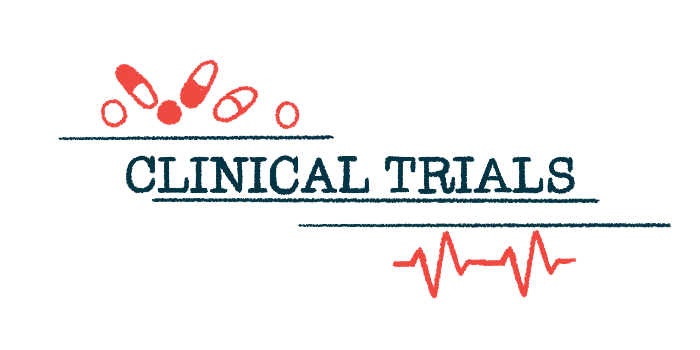NTLA-2002 Gene Therapy Safely Prevents HAE Attacks: Trial Data
NTLA-2002 uses the CRISPR/Cas-9 editing system to lower kallikrein levels

A single infusion of the investigational gene therapy NTLA-2002 was well tolerated at two different doses and reduced the number of swelling attacks in people with hereditary angioedema (HAE) by more than 90%, according to interim results from the Phase 1 portion of a Phase 1/2 trial.
The multinational trial (NCT05120830) is evaluating the safety, tolerability, pharmacokinetics, and pharmacodynamics of NTLA-2002 in up to 55 adults with HAE types 1 and 2 at sites in New Zealand, the Netherlands, and the U.K. Pharmacokinetics assesses how a treatment moves into, through and out of the body, while pharmacodynamics evaluates its effects on the body.
Dosing has also been completed for a third, intermediate dose in the Phase 1 portion of the trial. Treatment developer Intellia Therapeutics plans to choose two doses to evaluate in the Phase 2 portion, which will test NTLA-2002 against a placebo. That’s expected to begin in the first half of 2023 and to involve new trial sites, including in the U.S.
“Many people living with HAE continue to experience breakthrough attacks despite currently available treatments and often find the burden of untreated attacks, frequent infusions or injections to be tremendously disruptive to their lives,” Hilary Longhurst, MD, PhD, Faculty of Medical and Health Sciences, University of Auckland, New Zealand, and the trial’s principal investigator in New Zealand, said in a press release. “These early data support NTLA-2002 as a potential one-time treatment capable of producing profound reductions in HAE attacks. While the clinical data are still emerging, I am highly optimistic that NTLA-2002 could become a new treatment option for the HAE community.”
The study’s interim findings were presented Sept. 15–16 at the 2022 Bradykinin Symposium in Berlin.
HAE swelling attacks are triggered by higher than normal levels of a molecule called bradykinin. Its production and release are normally controlled by a protein called kallikrein.
NTLA-2002 uses a gene editing system called CRISPR/Cas-9 to lower kallikrein production by disrupting the activity of the KLKB1 gene that provides instructions for making its precursor. Intellia believes a subsequent reduction in bradykinin levels will reduce swelling attacks risks.
The gene therapy is packaged into tiny therapeutic carriers made of fat, called lipid nanoparticles, that facilitate its uptake by liver cells when infused into the bloodstream.
Interim Phase 1 results
In the Phase 1 portion of the trial, participants are being given a single infusion of NTLA-2002 at one of three doses, while being allowed to continue their maintenance medications to prevent attacks.
The newly announced interim data concerned the six participants who had been dosed as of a cutoff date of July 27, 2022, three at a 25 mg dose and three at 75 mg.
NTLA-2002 led to a dose-dependent decrease in kallikrein blood levels, reaching a mean reduction of 65% by week eight with 25 mg, which was sustained through at least 16 weeks. Mean kallikrein reduction was 92% in the 75 mg group, which was sustained through eight weeks as of the cutoff date.
A single dose of NTLA-2002 (25 mg) also led to a 91% mean reduction in HAE attacks during the initial 16-week observation period for the 25 mg group. At the study’s start, the attack rate was 1.1–7.2 a month.
Two of these patients hadn’t had an attack since receiving treatment and the third was attack-free since week 10. Also, two patients in the 25 mg group who were using preventive HAE treatments were able to stop them after completing the 16-week observation period.
“We are strongly encouraged by the greater than 90% reduction in HAE attacks observed in the 25 mg dose cohort, as these interim results support our belief that a single dose of NTLA-2002 has the potential to permanently prevent the debilitating swelling attacks associated with HAE,” John Leonard, MD, Intellia’s president and CEO, said.
Participants in the 75 mg group have not yet reached week 16. HAE attack data from that group will be presented at the American College of Allergy, Asthma, & Immunology Annual Scientific Meeting in Louisville, Kentucky, in November.
NTLA-2002 was generally well-tolerated at both doses with most adverse events being mild in severity, according to Intellia. The most common side effects were infusion-related reactions, which were mostly mild and resolved within a day. No dose-limiting toxicities, serious adverse events, severe side effects, or laboratory abnormalities have been observed.
The third dosing group in the Phase 1 part of the study received a 50 mg dose.
“These initial data represent a significant milestone for both Intellia and people around the world suffering from genetic diseases, such as HAE,” Leonard said. “Additionally, today’s announcement continues to validate our genome editing approach and the modular platform we have built. We plan to move as quickly and judiciously as possible on behalf of people living with HAE and a number of additional genetic diseases in the months and years ahead.”
NTLA-2002 earned orphan drug status from the U.S. Food and Drug Administration earlier this month, a status intended to speed its development toward regulatory approval.







